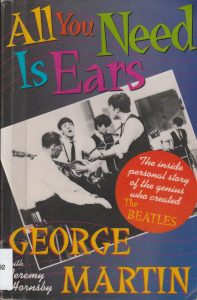How come boys and young men wanted to grow their hair long, going against the dominant social norms in the 1960s and 70s?
They were seen as girls, devalued and unmanly. Yet long hair became a way to demonstrate a youth revolt and a counter culture.
I am reading a lot of books, including music histories, for a book project on men and masculinities, in order to understand this change.
“All you need is ears”, Beatles producer George Martin argues, regarding the success of the Beatles – the leading long-haired band.
This is a good book regarding sound – a focused yet limited regarding the artistic contribution of the Beatles (and their sound as part of their artistic intention). Martin writes a lot about the technical issues and troubles with analog recording, with too few tracks and too much noise, and the text (written in the late 1970s) is more technical than emotional.
Yet this is the text of a record producer, not an artist, and should be judged on its own merits.
Much of what he says about analog recording, written before the advent of digital recording, which emerged some years later than this text (in the early 1980ies, with CDs supposed to represent “perfect sound forever”) is still relevant and interesting today. His book gives valuable knowledge, for example, on how to set up microphones, how to adjust for different instruments, and how to get the full sound of a band.
George Martin the producer and sometime-co-musician with the Beatles was never fully credited for his work. This is made very evident in the last part of the book. His complaints are reasonable, but his nagging tone, bringing up the theme, also reminds me of other recent music books I have read, in the direction, “I should have been paid x times more”. Artists and contributors often start out from artistic and idealistic reasons, but often end up – even if they sell well (or, especially in that case) – in conflicts regarding revenues, profits and egos. With maybe the ego part the hardest territory to negotiate. Alltogether, the in-depth books I read, including biographies of rock bands, artists and producers, describe a complaint against music capitalism. You can make a hit, but from then on, you are on the run.


